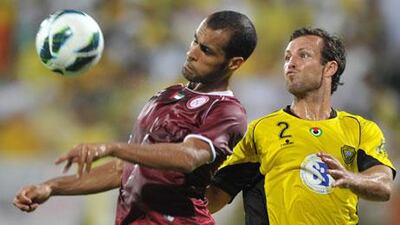Saeed Al Kathiri is a tantalising talent for both club and country.
Unusually tall, at 1.83m, for an Emirati striker, competent in the air, a product of Al Wahda's well-regarded age-group sides and, twice now, a scorer for the national team.
His most recent goals have thrust him into the frame for both Wahda and the senior national side.
His goal against Kuwait in a friendly this month was the opener in a 3-0 victory, and he followed that with a pair of goals for Wahda against Al Nasrin the Etisalat Cup competition.
His performances have given Mahdi Ali, the national team coach, more attacking options ahead of the friendlies against Australia, Bahrain and Slovenia, in preparation for the Gold Cup in January.
With Ismail Matar sidelined by injury, Al Kathiri, 24, was drafted into the national team for the first two matches of Mahdi Ali's tenure, a 1-0 defeat away to Japan and the victory over Kuwait at home four days later.
In the past, he lingered in the shadows of Wahda's Brazilian striker Fernando Baiano and Matar, one of the best-known Emirati footballers. But this season he has got two starts in as many games for his club.
"I am sure he will get more opportunities this season," said Abdullah Salem, the former Wahda captain and now the team manager.
"I have known him for more than 10 years and he is as an excellent forward prospect for our club. He was the top scorer in the club's youth team before he graduated to the first team in 2009."
Al Kathiri's first season in the first team was also Salem's last, and he recalled the expectations surrounding the young striker.
"He was earmarked as a player for the first team and when he was eventually selected he had to fight for a position that was occupied by Baiano and Ismail, the two first-choice players," Salem said.
It was the Brazilian's first season at Wahda, and he led them in scoring with 18 league goals, second in the Pro League behind Jose Sand of Al Ain.
Wahda won the league title in 2010 and Al Kathiri would have had a hard time complaining that he deserved to be in the first XI.
"He was still lucky because he got a few starts and had a lot of opportunities to get on to the pitch as a substitute in his first season. And he scored whenever he got the chance to play," Salem said.
"It is quite unfortunate that he had to come at a time when Baiano was at his peak and Ismail an automatic selection ahead of all the Emirati players.
"But Saeed will get more opportunities than the previous three seasons."
Al Kathiri suffered a knee injury in his second season, which hampered his progress for two seasons.
"He has recovered fully and has done some good work over the summer. That was the reason he was recalled to the national team as a replacement for Ismail for the two recent friendlies," Salem said.
Al Kathiri brings much-needed depth to the national team's striking options, which of late have included Ahmed Khalil of Al Ahli, Ali Mabkhout of Al Jazira, Ahmed Ali of Baniyas and Matar.
Branko Ivankovic, the Wahda coach who took charge in July, was impressed by Al Kathiri's work over the summer.
"He had only around four or five starts at Wahda last season and to be called up for national duty only goes to show how much quality work he has done during our pre-season training," the Croatian said.
"He has good technical skills and is very sharp in front of the goalmouth. He is quite lethal with his shots and as a taller Emirati player he is also pretty good on the high ball. We have a few players in that position and he gives all of them a good run.
"I like players to compete for their places and this is good for the team. Saeed is right up there yet he has to compete for his place in the line-up."
His competition is formidable and includes Papa Waigo, the Senegalese striker, Marcelo Oliveira, the Brazilian who was signed as replacement for the injured Gabon international Eric Mouloungui, and Matar. Al Kathiri has 17 goals to his name in all domestic competitions over the past three years, including the brace he scored in the Etisalat Cup in the first match this season. He has scored twice for the national team with his debut goal coming in 2010 during the first of the five appearances he has made so far.
He has a younger brother, Zayed, who plays as a midfielder for Wahda.
Both of them are alumni of the club's academy.
Khaled Awadh, the deputy chief executive at Wahda, has watched the brothers mature and thinks the elder is prepared to make his presence felt in top-tier competition.
"I can only wish players like Saeed get more playing opportunities at the top-flight domestic competition so they can contribute to the national team," said Awadh, a former UAE team manager.
"Players like him are suffering because all clubs have foreign players as their main forwards.
"This is something that will not change in the near future but Saeed has to take his chance from opportunities.
"As a person, he is very quiet and liked by all his teammates. He has an excellent work ethic.
"I have seen him work his way up from the age-group teams and I think we will see the best in him this season."
Follow us


